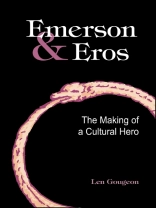Traces the spiritual, psychological, and intellectual evolution of one of America’s most important cultural figures.
This critical biography traces the spiritual, psychological, and intellectual growth of one of America’s foremost oracles and prophets, Ralph Waldo Emerson (1803–1882). Beginning with his undergraduate career at Harvard and spanning the range of his adult life, the book examines the complex, often painful emotional journey inward that would eventually transform Emerson from an average Unitarian minister into one of the century’s most formidable intellectual figures. By connecting Emerson’s inner life with his outer life, Len Gougeon illustrates a virtually seamless relationship between Emerson’s Transcendental philosophy and his later career as a social reformer, a rebel who sought to ‘unsettle all things’ in an effort to redeem his society.
In tracing the path of Emerson’s evolution, Gougeon makes use of insights by Joseph Campbell, Erich Neumann, Mircea Eliade, and N. O. Brown. Like Emerson, all of these thinkers directly experienced the fragmentation and dehumanization of the Western world, and all were influenced both directly and indirectly by Emerson and his philosophy. Ultimately, this study demonstrates how Emerson’s philosophy would become a major force of liberal reformation in American society, a force whose impact is still felt today.
Tabella dei contenuti
Contents
Acknowledgments
Prologue
1. Psychomythic Humanism: Re-centering Reality
2. The Spirit and the Flesh
3. ‘God’s Child’: Emerson in His Journals
4. ‘The Devil’s Child’: Emerson’s Early Public Voice
5. The Call To Serve: Re-centering America
Epilogue
Notes
Works Cited
Index
Circa l’autore
Len Gougeon is Distinguished Professor of American Literature, Emeritus, at the University of Scranton, past President of the Ralph Waldo Emerson Society, and recipient of the society’s Distinguished Achievement Award. He is the author of Emerson and Eros: The Making of a Cultural Hero, also by SUNY Press.












